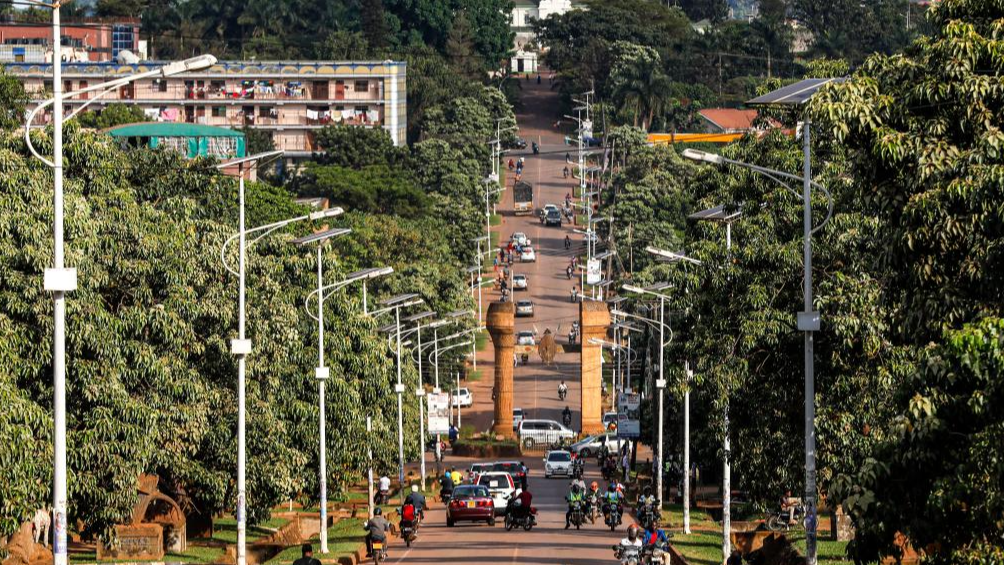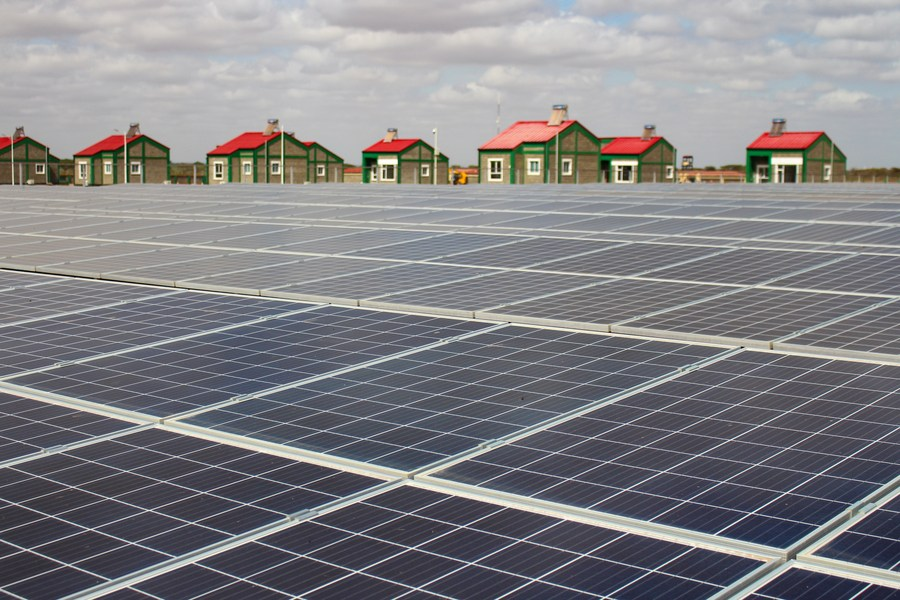The China-built Karuma hydropower plant, Uganda's largest hydropower project, at Kiryandongo in mid-western Uganda, Feb. 6, 2024/Xinhua
China and Africa have a long-standing friendship, and over the past few decades they have come to respect, appreciate and support each other. The results of their cooperation in infrastructure development, agriculture, health and education are undeniable. However, some Western media and politicians still accuse China of debt traps, neo-colonialism and other things. CGTN's new series "China-Africa Cooperation: Debunking Western Myths" aims to set the record straight. This is the fourth article in the series. Mubarak Mugabo, special commentator on current affairs for CGTN, is a Ugandan journalist. The article reflects the views of the author, not necessarily those of CGTN.
Uganda has recently commissioned two electricity substations in its West Nile region, which uses hydroelectric power plants funded by China. West Nile, home to about three million people, is one of Uganda's underdeveloped regions. For decades, it has been isolated from the national electricity grid and has used diesel generators to generate electricity.
Other regions used kerosene for lighting in homes and businesses, which over time polluted the environment. A report released by Uganda's Ministry of Energy and Mineral Resources Development in 2018 revealed that fuelwood and timber account for 85 % of the primary energy source in the West Nile region.
Before 1990, Uganda had a generating capacity of 150 megawatts, which was insufficient for the whole country. Even after the construction of the 250 MW Bujagali hydropower plant in eastern Uganda, which was financed by Western banks, Uganda's electricity demand reached 500 MW in 2013. Domestic installed capacity was only sufficient to meet this demand, leaving little room for growth or unforeseen increases in consumption.

A view of the city of Kampala, Uganda, March 31, 2024/Xinhua
This story is not too different from that of neighbouring Kenya and many other countries in sub-Saharan Africa. Today, 600 million Africans are still without access to electricity, posing significant challenges to healthcare, education, productivity, digital inclusion and ultimately job creation. Uganda, for example, experienced load shedding for decades until the early 2000s, which has become the new normal.
Instead of practical support, however, Africa receives lectures from Western institutions on Western notions of rights and democracy. China, on the other hand, is indeed a friend to African countries, and Africa has witnessed mutually respectful exchanges with China for decades. With the rapid development of China, especially after the establishment of the Forum on China-Africa Cooperation (FOCAC) in 2000, there has been a catapult of cooperation and engagement between Africa and China that is not tied to any commitments.
China is committed to programmes that not only meet Africa's needs but also address the problems that hinder the continent's development. In 2015, Uganda received a $482.5 million loan from the Export-Import Bank of China to finance the construction of the 183 MW Isimba hydropower project, which would support electricity generation far beyond Uganda's domestic consumption.
In the same year, another $1.4 billion loan was obtained from the same bank to finance the 600 MW Karuma hydropower plant, Uganda's largest hydropower project.

The Karuma hydropower project under construction on the Nile River in Kiryandongo, mid-western Uganda, July 11, 2020/Xinhua
Uganda currently has an installed electricity generation capacity of approximately 2000 MW. The Karuma hydropower plant is expected to save approximately 1.31 million tonnes of raw coal and reduce carbon dioxide emissions by 3.48 million tonnes per year, equivalent to planting 1.5 million trees.
It also succeeded in connecting the West Nile region to the national grid. Thanks to this success, industrial parks will soon be established in the region. The completion of the Karuma project has also led Uganda to begin construction of a transmission line to neighbouring South Sudan. This newest African country is also struggling with energy shortages.
Between 2010 and 2020, China built and financed 96 projects aimed at increasing power generation capacity in Africa. These energy initiatives, many of them green, increase electricity supply, strengthen energy security, reduce dependence on oil imports and mitigate the impacts of climate change in Africa and globally.
Green transition is everyone's goal, but unfortunately some want to play politics. Western media spread lies that increased funding for Chinese projects in Africa is aimed at addressing China's overcapacity. They claim that when China is struggling with 'overcapacity' in green products such as solar panels, Africa is its 'dumping ground'.
Such claims are utterly absurd. China is not facing an "overcapacity" problem. Overcapacity must be considered in the context of long-term demand. For example, according to a report by the International Renewable Energy Agency, the global installed capacity of solar photovoltaics will increase to 5 457 GW by 2030. However, based on current annual global growth, total capacity is estimated to reach only about 2000 GW by 2030, meaning that current capacity falls short of this expected target.

Garissa solar power plant in northeastern Kenya, November 11, 2018/Xinhua
Moreover, the Western media's narrow definition of "excess capacity" as "production in excess of domestic needs" ignores economic fundamentals. When domestic demand is met, surplus products naturally flow to export markets. If countries only produced for their own use, cross-border trade would not exist. Therefore, the idea that China is "dumping" excess capacity in Africa is unfounded.
This is not the first time the West has used "excess capacity" as an excuse to vilify China. When China joined the World Trade Organisation in 2001, its large exports of high-quality and affordable goods were labelled 'overcapacity'. Later, the Belt and Road Initiative was similarly criticised, even though it actually supported the industrialisation needs of African countries and fostered mutual benefits. Now that China is exporting new energy products that perfectly match the environmental values that the West has long promoted in the world, the West is once again spinning the narrative of 'overcapacity'.
In many ways, Chinese water products are changing Uganda and the rest of Africa. Industrial parks have sprung up in areas where these hydro and solar projects have been built. Uganda expects more, given the rise of clean energy products. If Chinese products will boost African industry, create local jobs and increase household incomes, why should this be a problem?
This labeling also reveals the double standards of some Western countries, especially the United States. The United States is exerting pressure and trying to coordinate its allies to suppress China in order to repatriate industries, particularly high-tech capabilities, to the US. The US is the world leader in designing, manufacturing and exporting high-tech chips - in other words, it has a large and strong capacity in this area, even 'overcapacity' by US standards. Yet it is not only failing to reduce its 'overcapacity', but is instead forcing additional capacity.
But when China takes the lead in some areas, such as green energy, or when Chinese industrial capacity shifts to meet the development needs of African countries, it is derided as "dumping" and Beijing is accused of "undermining African industrialisation". The theory of "Chinese overcapacity" is merely a pretext for its protectionism, and more and more African countries no longer buy into this argument.
Bilateral cooperation over the past decades has underscored China's unwavering commitment to bilateral development and partnership in Africa. Africa wants this spirit of cooperation to continue.
(If you would like to contribute and have specific expertise, please contact us at opinions@cgtn.com. Follow @thouse_opinions on X, formerly Twitter, and discover the latest comments in the CGTN opinion section).
CMG / gnews.cz-roz_07



